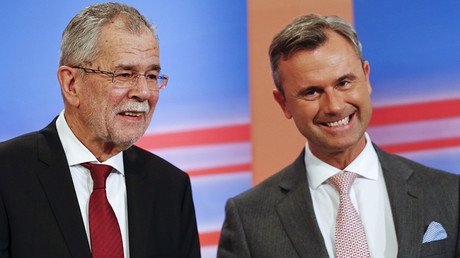Austrian presidential cliffhanger: Far-right Hofer concedes defeat to Green Van der Bellen
The Green Party’s Alexander Van der Bellen has won Austria’s presidential election, beating the Freedom Party’s Norbert Hofer in a neck and neck race, according to the Interior Ministry. A mere 0.6 percent of the mail-in ballot made the difference.
The Interior Ministry’s figures showed Van der Bellen won with a final total of 50.3 percent of the vote, with Hofer securing 49.7.
Austria: #vanderBellen new President of #Austria. Detailed Result on the Website of Ministry of Interior: pic.twitter.com/gTwMoLUXVS
— Europe Elects (@EuropeElects) May 23, 2016
Now Van der Bellen, who ran as an independent but whose campaign was backed financially by his party, is to become Austria’s first Green president.
Hofer has already posted an address to his supporters conceding defeat:
“I thank you for your great support. Of course I'm sad today. I would like to watch out for you as president of our wonderful country. I will remain loyal to you and make my contribution for a positive future of Austria. Please do not be discouraged. The cause of this election campaign is not lost, consider it an investment into the future,” Hofer wrote on his Facebook page.
VDB 50.3 - 2.254.484
— neuwal (@neuwalcom) May 23, 2016
HOF 49.7 - 2.223.458#bpw16
___
Bild: Screenshot orf.at pic.twitter.com/9BQXL3ZjXC
In a race that was almost too close to call, the 4.48 million direct votes counted on Sunday, before postal votes were added, gave 72-year-old Van der Bellen 48.1 per cent against 51.9 percent for his rival, the Euroskeptic, anti-immigration Hofer.
The remaining 885,000 mail-in ballots – more than 10 percent of the 6.4 million Austrians eligible to vote – took some 20 hours to count, and overturned Sunday’s results.
Before the election began, Van der Bellen was considered a firm favorite. It was Hofer who unexpectedly won the first round, though, claiming 35 percent of votes compared to 21.3 percent for Van der Bellen.
However, Hofer’s failure to secure a majority of votes paved the way for the runoff.
A number of Austrian political analysts and pollsters, including the SORA policy research institute, recently predicted the mail-in ballots were likely to favor Van der Bellen, as the majority of these votes are cast by expatriates who tend to prefer open-border and pro-EU policies.
Furthermore, as an economics professor and former head of the increasingly popular eco-friendly Green Party, Van der Bellen has strong support in cities.
During his election campaign, Van der Bellen spoke of his hopes for a closing of ranks between supporters of all major parties in order to prevent the Freedom Party (FPO) from winning the election, describing himself as a “lesser evil.”
Van der Bellen’s campaign was not as controversial as Hofer’s, who had even carried a gun to election rallies, calling it a “natural consequence” of immigration.
Hofer and the FPO’s nationalist appeal to put “Austria first,” paired by strong opposition to “forced multiculturalism, globalization and mass immigration” secured the candidate increasing support because of deepening frustration with the ruling parties and how they are dealing with the migrant crisis that has engulfed Europe.
“I'm not a dangerous person, of course. But those people […] who don't appreciate our country, who go to war for the Islamic State [IS, formerly ISIS/ISIL] or rape women – I say to those people: ‘This is not your home! You can't stay in Austria!’ Because we differentiate very clearly between those who continue to build up Austria together with us and those who only care about destroying this country. We have to make this differentiation,” Hofer said in a recent election rally.
The prospect of Hofer’s victory shocked European political establishments long before the runoffs. Senior European officials like Martin Schulz, the president of the European Parliament, issued warnings that “Europe’s character will be changed” if the FPO wins the post. European Commission President Jean-Claude Juncker called on Austrian people to vote for any alternative to Hofer.
Still, this is the first time in Austrian history that no candidate from the traditionally powerful centrist coalition parties (Social Democratic SPO and Conservative OVP) was represented in the runoffs. SPO member and Austrian Chancellor Werner Faymann had resigned earlier in May, partly because of his party’ debacle in the first round of presidential elections.
Political analyst Gerhard Mangott told RT the huge success of the Freedom Party and the fact that none of the ruling parties even got into the runoffs shows that Austrians are deeply dissatisfied with the way the authorities are dealing with existing problems – with mass immigration just one of these.
“It was […] a vote against the establishment. People are fed up with the current government that is not able to deal with the economic crisis in the country. It was a socially-motivated protest against the government,” Mangott said.
He also noted that despite losing the presidential election, Hofer and his party’s current success is a clear sign the right-wingers will not take no for an answer and will target the position of chancellor next.
“[…] despite the fact that they’ve lost today they will use all the support they’ve received now for the forthcoming parliamentary election.”













